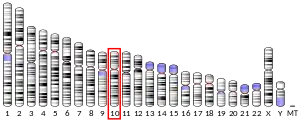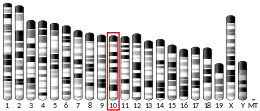V-domain Ig suppressor of T cell activation (VISTA) is a type I transmembrane protein that functions as an immune checkpoint and is encoded by the C10orf54 gene.[5][6][7]
Structure and function
VISTA is approximately 50kDa and belongs to the immunoglobulin superfamily and has one IgV domain.[8][5]
VISTA is part of the B7 family, is primarily expressed in white blood cells and its transcription is partially controlled by p53.[8][9] There is evidence that VISTA can act as both a ligand[10] and a receptor[11] on T cells to inhibit T cell effector function and maintain peripheral tolerance.[5][8]
Clinical significance
VISTA is produced at high levels in tumor-infiltrating lymphocytes, such as myeloid-derived suppressor cells and regulatory T cells, and its blockade with an antibody results in delayed tumor growth in mouse models of melanoma[12] and squamous cell carcinoma.[13]
Monocytes from HIV-infected patients produce higher levels of VISTA compared to uninfected individuals. The increased VISTA levels correlated with an increase in immune activation and a decrease in CD4-positive T cells.[14]
As a drug target
There is an ongoing cancer immunotherapy clinical trial for a monoclonal antibody targeting VISTA in advanced cancer.[15] Preliminary results of the phase I clinical trial show good safety tolerance and anti-cancer activity in patients with advanced tumours.[16] Another ongoing clinical trial involves a small molecule that antagonizes the programmed death-ligands 1 and 2 (PD-L1 and PD-L2), and VISTA pathways in patients with advanced solid tumors or lymphomas.[17]
References
- 1 2 3 GRCh38: Ensembl release 89: ENSG00000107738 - Ensembl, May 2017
- 1 2 3 GRCm38: Ensembl release 89: ENSMUSG00000020101 - Ensembl, May 2017
- ↑ "Human PubMed Reference:". National Center for Biotechnology Information, U.S. National Library of Medicine.
- ↑ "Mouse PubMed Reference:". National Center for Biotechnology Information, U.S. National Library of Medicine.
- 1 2 3 Le Mercier I, Lines JL, Noelle RJ (August 2015). "Beyond CTLA-4 and PD-1, the Generation Z of Negative Checkpoint Regulators". Frontiers in Immunology. 6: 418. doi:10.3389/fimmu.2015.00418. PMC 4544156. PMID 26347741.
- ↑ Clark HF, Gurney AL, Abaya E, Baker K, Baldwin D, Brush J, Chen J, Chow B, Chui C, Crowley C, Currell B, Deuel B, Dowd P, Eaton D, Foster J, Grimaldi C, Gu Q, Hass PE, Heldens S, Huang A, Kim HS, Klimowski L, Jin Y, Johnson S, Lee J, Lewis L, Liao D, Mark M, Robbie E, Sanchez C, Schoenfeld J, Seshagiri S, Simmons L, Singh J, Smith V, Stinson J, Vagts A, Vandlen R, Watanabe C, Wieand D, Woods K, Xie MH, Yansura D, Yi S, Yu G, Yuan J, Zhang M, Zhang Z, Goddard A, Wood WI, Godowski P, Gray A (Oct 2003). "The secreted protein discovery initiative (SPDI), a large-scale effort to identify novel human secreted and transmembrane proteins: a bioinformatics assessment". Genome Res. 13 (10): 2265–70. doi:10.1101/gr.1293003. PMC 403697. PMID 12975309.
- ↑ "Entrez Gene: C10orf54 chromosome 10 open reading frame 54".
- 1 2 3 Yoon KW, Byun S, Kwon E, Hwang SY, Chu K, Hiraki M, Jo SH, Weins A, Hakroush S, Cebulla A, Sykes DB, Greka A, Mundel P, Fisher DE, Mandinova A, Lee SW (July 31, 2015). "Control of signaling-mediated clearance of apoptotic cells by the tumor suppressor p53". Science. 349 (6247): 1966–75. doi:10.1126/science.1261669. PMC 5215039. PMID 26228159.
- ↑ Wang L, Rubinstein R, Lines JL, Wasiuk A, Ahonen C, Guo Y, Lu LF, Gondek D, Wang Y, Fava RA, Fiser A, Almo S, Noelle RJ (March 14, 2011). "VISTA, a novel mouse Ig superfamily ligand that negatively regulates T cell responses". Journal of Experimental Medicine. 208 (3): 577–92. doi:10.1084/jem.20100619. PMC 3058578. PMID 21383057.
- ↑ Lines JL, Pantazi E, Mak J, Sempere LF, Wang L, O'Connell S, Ceeraz S, Suriawinata AA, Yan S, Ernstoff MS, Noelle R (April 1, 2014). "VISTA is an immune checkpoint molecule for human T cells". Cancer Research. 74 (7): 1924–32. doi:10.1158/0008-5472.CAN-13-1504. PMC 3979527. PMID 24691993.
- ↑ Flies DB, Han X, Higuchi T, Zheng L, Sun J, Ye JJ, Chen L (April 17, 2014). "Coinhibitory receptor PD-1H preferentially suppresses CD4⁺ T cell-mediated immunity". Journal of Clinical Investigation. 124 (5): 1966–75. doi:10.1172/JCI74589. PMC 4001557. PMID 24743150.
- ↑ Le Mercier I, Chen W, Lines JL, Day M, Li J, Sergent P, Noelle RJ, Wang L (April 1, 2014). "VISTA Regulates the Development of Protective Antitumor Immunity". Cancer Research. 74 (7): 1933–44. doi:10.1158/0008-5472.CAN-13-1506. PMC 4116689. PMID 24691994.
- ↑ Kondo Y, Ohno T, Nishii N, Harada K, Yagita H, Azuma M (May 3, 2016). "Differential contribution of three immune checkpoint (VISTA, CTLA-4, PD-1) pathways to antitumor responses against squamous cell carcinoma". Oral Oncology. 57: 54–60. doi:10.1016/j.oraloncology.2016.04.005. PMID 27208845.
- ↑ Bharaj P, Chahar HS, Alozie OK, Rodarte L, Bansal A, Goepfert PA, Dwivedi A, Manjunath N, Shankar P (October 3, 2014). "Characterization of programmed death-1 homologue-1 (PD-1H) expression and function in normal and HIV infected individuals". PLOS ONE. 9 (10): e109103. Bibcode:2014PLoSO...9j9103B. doi:10.1371/journal.pone.0109103. PMC 4184823. PMID 25279955.
- ↑ "A Study of Safety, Pharmacokinetics, Pharmacodynamics of JNJ-61610588 in Participants With Advanced Cancer". Retrieved September 25, 2016.
- ↑ Calvo, Emiliano (February 26, 2018). "Interim results of a phase 1/2 study of JNJ-63723283, an anti-PD-1 monoclonal antibody, in patients with advanced cancers". Journal of Clinical Oncology. 36 (5_suppl): 58. doi:10.1200/JCO.2018.36.5_suppl.58.
- ↑ "A Study of CA-170 (Oral PD-L1, PD-L2 and VISTA Checkpoint Antagonist) in Patients With Advanced Tumors and Lymphomas". Retrieved September 26, 2016.
Further reading
- Colland F, Jacq X, Trouplin V, et al. (2004). "Functional proteomics mapping of a human signaling pathway". Genome Res. 14 (7): 1324–32. doi:10.1101/gr.2334104. PMC 442148. PMID 15231748.
- Zhang Z, Henzel WJ (2005). "Signal peptide prediction based on analysis of experimentally verified cleavage sites". Protein Sci. 13 (10): 2819–24. doi:10.1110/ps.04682504. PMC 2286551. PMID 15340161.
- Wan D, Gong Y, Qin W, et al. (2004). "Large-scale cDNA transfection screening for genes related to cancer development and progression". Proc. Natl. Acad. Sci. U.S.A. 101 (44): 15724–9. Bibcode:2004PNAS..10115724W. doi:10.1073/pnas.0404089101. PMC 524842. PMID 15498874.
- Rual JF, Venkatesan K, Hao T, et al. (2005). "Towards a proteome-scale map of the human protein-protein interaction network". Nature. 437 (7062): 1173–8. Bibcode:2005Natur.437.1173R. doi:10.1038/nature04209. PMID 16189514. S2CID 4427026.




